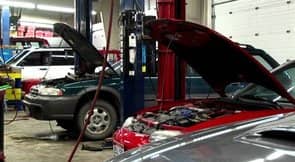What Every Vehicle Owner Needs to Know about Auto Defects and Safety Issues
Each year, more than 30,000 lives are lost on our nation's highways. Of course, this number reflects a 28 percent decrease since 2006. But, traffic accidents still remain the primary cause of debilitating injuries and number one killer of Americans under 34.
In addition to staggering emotional costs, the annual economic loss to society because of these crashes, factoring in worker productivity, medical and insurance costs, is estimated at about $230 billion.
This shows that there is still a need for dramatic improvements in vehicle safety. Getting unsafe and defective vehicles off the road is critical to improving vehicle safety and saving lives.
Motor Vehicle Safety Act
 The National Traffic and Motor Vehicle Safety Act, which was originally enacted in 1966 and is now codified as 49 U.S.C. Chapter 301, gives the U.S. National Highway Traffic Safety Administration (NHTSA) the power to issue vehicle safety standards. It also requires automakers to recall vehicles that have safety-related defects or those vehicles that fail to meet federal safety standards.
The National Traffic and Motor Vehicle Safety Act, which was originally enacted in 1966 and is now codified as 49 U.S.C. Chapter 301, gives the U.S. National Highway Traffic Safety Administration (NHTSA) the power to issue vehicle safety standards. It also requires automakers to recall vehicles that have safety-related defects or those vehicles that fail to meet federal safety standards.
Since this law has been enacted more than 390 million defective cars, trucks, buses, recreational vehicles and motorcycles have been recalled. In addition 46 million tires, 66 million vehicle parts and 42 million child safety seats have also been recalled over the decades to fix safety defects.
Just in the year 2012, NHTSA issued 650 safety recalls affecting over 17.8 million vehicles, vehicle equipment and child seats. During that same year, the NHTSA influenced the recall of over nine million vehicles and auto equipment including tires and child safety seats. Defect and compliance investigations led to over 430 recalls, which affected 22 million vehicles and products.
When is a Vehicle Recalled?
Just because your vehicle has not been recalled, 100 percent safety is not guaranteed. In fact, there are many vehicles on the roadway right now that have not been recalled, but could still contain a faulty part of some type of defect.
NHTSA monitors complaints and reviews whether or not an investigation is needed into a particular vehicle model. It is only after a significant number of similar complaints are filed that NHTSA will launch an investigation.
Even if the investigation proves that a part is defective, the auto manufacturer still might resist a recall until NHTSA forces it because a recall could cost them millions of dollars and even more in bad publicity.
A recall is a necessary step if there is a safety-related defect in the vehicle or equipment or if the motor vehicle does not comply with a Federal Motor Safety Standard.
There are minimum performance requirements for vital vehicle parts such as the brakes, lights, safety belts, child restraints, seats, air bags and tires. These federal standards are applicable to all types of vehicles.
Safety-Related Defects
Under the United States Code for Motor Vehicle Safety, a defect is "any defect in performance, construction, a component, or material of a motor vehicle or motor vehicle equipment."
A safety defect is one that poses a risk and exists in a group of vehicles of similar design.
Examples of safety defects include:
- Issues with fuel system components that could potentially cause fuel leaks and vehicle fires.
- Accelerator controls that may break or stick causing sudden or unintended acceleration.
- Wheels that crack or break resulting in loss of vehicle control.
- Steering components that break causing loss of vehicle control.
- Seats or seatbacks that fail unexpectedly during normal use.
- Windshield wiper assemblies that fail to operate properly.
- Airbags that fail to deploy or deploy suddenly.
- Child safety seats that contain defective safety belts, buckles or components that create a risk of injury in a vehicle crash.
Reporting a Safety Problem to the NHTSA
If you believe that your vehicle or a vehicle part may be defective, reporting it to NHTSA is a vital first step to take in order to get the situation remedied. If the agency receives similar reports from other vehicle owners about the same product, NHTSA may launch an investigation, which could result in a recall.
There are three ways in which you could file a complaint with NHTSA:
Vehicle Safety Hotline: NHTSA operates this hotline telephone service to collect accurate and timely information from consumers on vehicle safety problems. You can call 1-888-327-4236 or 1-800-424-9393 toll free from anywhere in the United States to register complaints or receive recall information about a vehicle.
The hotline also has Spanish-speaking representatives and offers a dedicated number, 1-800-424-9153, for use by persons with hearing impairments. When you call this number, you will be asked to provide critical information about the problem you experienced.
Safercar.gov: You can also report the problem online to NHTSA through their web site, Safercar.gov. Select "File a Complaint" within the "Defects and Recalls" section on the home page. The information will then be entered into their complaint database and forwarded to their technical staff for evaluation.
Mail: You can also send a written complaint to NHTSA via mail to Office of Defects Investigation (NVS-210), 1200 New Jersey Ave. SE, Washington, DC 20590.
Getting the Help You Need
Once a vehicle safety recall is issued, the automaker will mail you a recall notice after which you can take your vehicle to the dealer and get the faulty part repaired at no cost. If you have suffered injuries as a result of a recalled vehicle or defective auto, you can also file a product liability claim or lawsuit against the automaker and/or the maker of the faulty part.
It is important that you contact an auto defect law firm that has successfully handled these types of cases against large automakers.
The Orange County auto defect law firm of Bisnar Chase Personal Injury Attorneys has a long and successful track record of fighting industry giants like Ford, Chrysler, General Motors and Toyota on behalf of injured clients and their families.
We have represented catastrophically injured clients in auto defect cases and obtained tens of millions of dollars in compensation for them.
We do not settle with an automaker without knowing that you and your family will be properly compensated for the negligence of a corporation that caused your present condition. Our law firm has the resources it takes to litigate auto defect cases against these large manufacturers and win.
If you or a loved one has been injured as the result of an auto defect, please contact us at 949-203-3814 for a Free consultation and comprehensive case evaluation.
